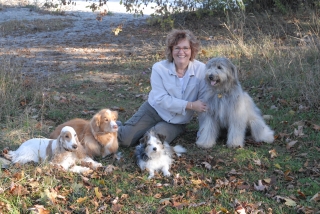With All Due Respect

Respect is a word that is often tossed around lightly. In the dog training community it is a word that is gaining in popularity by leaps and bounds. We want our dogs to respect us, that is a given. It is a term used by trainers of every method, but thought of quite differently amongst each other. Yes, we need to teach our dogs how to be respectful, but it is now time to also look at the respect we should give back in return.
Respect means to avoid harming, degrading, insulting or injuring someone. It means we should treat with consideration, which in turn means we should be careful not to cause hurt. In looking at this word a bit closer, we can see that it can have a different meaning depending on your view as a dog or your view as the dog owner.
We are generally asking our dogs to not hurt us, to show some deference to us, a respectful compliance. And in terms of the dogs, the respect we need to show them should be to keep them from harm. The training technique we choose should lean towards the absence of degradation.
When teaching your dog anything, make sure he fully understands what you mean. It is common for new dog owners to raise their voices or make their commands sharper in order to elicit the response they desire. It may even be thought that the dog will respond to the firmer tone. This is usually a result of training them to listen to only that tone. Take any word, even “sit”. You have a choice in how to instruct your dog. You can tell the dog to sit in a sharp tone and pull up on his collar if he doesn’t respond, and become more annoyed if he pops back up. This can become a vicious cycle, with the owner becoming increasingly frustrated and blaming the dog. The dog may feel the pressure and often not be able to learn while in a stressed state. This is a loose/loose situation.
It is far more productive to teach the dog what you mean rather than quickly applying an aversive. Teach the word, and reward the word. If he has difficulty, show him again. Don’t jump to the conclusion that he is defiant, he might simply not have fully learnt what you mean. After all, think about how long it takes any of us to learn a new skill, especially one taught in a foreign language. It might take your dog a bit longer to learn what you are teaching, but this is not a race. Enjoy each day and enjoy the process.
This does not mean you never have to say the word “no”, or that you are a pushover. In fact, it means the opposite. You should have a word or sound that indicates he is incorrect, as this will move him closer to the desired behavior. The sound of ah-ah is a good one to use. Use this sound when your dog does something incorrect, such as pop up out of the sit. Then have him try again. He will soon learn that this sound means nothing great is coming his way. No toy, no treat and no praise. It does not mean something horrible is happening, just nothing good for him. Once he learns that his appropriate behavior gets him his reward, he will be ready, willing and able to comply.
There is no reprimand before education. This sentence alone is important and powerful and should be considered at all times while teaching your dog.
So, we are asking our dogs to respect us, to simply do as we ask. In turn we should seek out methods that are respectful to them, that cause no harm while teaching. There are basically only two methods of dog training. One method is that you reward the dog for doing the correct behavior and the other one is that you reprimand the dog for doing the incorrect behavior. Meaning simply, the dog will work for something he wants or to avoid something he doesn’t want. Considering the amount of alternatives available, it seems obvious that we would all prefer to teach the dog to work for something he likes. The only other option is to teach by intimidation and fear, and to have him work to avoid something that is harmful or painful. Dogs on collars designed specifically to teach the dog how to avoid the collar being used are not being taught in a respectful manner, they are being taught in a controlling, degrading way.
When education runs out, aggression and frustration set in. When people don’t know what to do and run out of options, they tend to lash out and usually at something lower than them, such as the dog. They don’t have the tools to cope with the situation. One way around this is to become more educated. Study learning theory, not just control of the dog. Learn to figure out techniques that help your dog learn and then concentrate on applying them on a daily basis. Have a great dog and show him off, teach others how you got that far and make sure you both have fun in the process. It is okay to have fun while teaching your dog, and even more fun if your dog is also enjoying himself. You will also be able to sleep at night knowing you gave it your all.
Training or teaching your dog should not be a power struggle or a war of egos. The alpha rollover is a good example of this. Often touted as the method to show dogs who is “boss” in the middle 1980’s, it was the key exercise to show pups who was really in charge. We were all instructed to flip our dogs onto their backs and hold them down until they would submit to us. This was probably devastating to our dogs, erasing all trust they had in us and now had us shake our heads and realize that the end does not always justify the means. Luckily we discovered other options and this method has now faded into the background. The Alpha Rollover can still be found in a lot of old-style training books, so becareful what you read. It is said that when you know better, you do better, and hopefully we can all follow that idea. Job Michael Evans was a popular trainer many years ago and suggested this method in his books during this time. Shortly before his death he said if he had one wish, he would recover all his books and change that chapter.
What we have to do to instill respect in our dogs towards us, and to show respect to them, is to be very consistent. You need to say what you mean and mean what you say. Showing the dog clearly what you want, and rewarding for only that, is the key. It is not a matter of just handing over treats to the dog, and it is not a matter of letting them get away with being disrespectful to their people. It is a matter of raising and teaching a dog with the proper education and with your ego checked at the door.
It is not good to simply praise and pat the dog during a training session because he is cute, you need to stick to the plan and teach him properly. One reason that marker based training gets some backlash is that perhaps the dog owners using it are not being consistent, and giving in to those big brown eyes too quickly. Make it your mission to have a fabulous, well-behaved, well-liked and well-loved family member. Treat your dog with consideration and you will earn and keep his trust forever.




